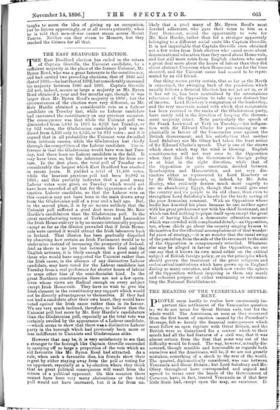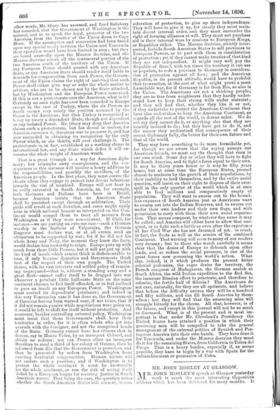THE MEANING OF THE VENEZUELAN SETTLE- p EOPLE seem hardly to
realise how enormously im- portant this settlement of the Venezuelan question is ; we do not mean for Great Britain only, but for the whole world. The Americans, as soon as they recovered from the first burst of emotion caused by the President's Message, felt so keenly the financial consequences which must follow an open rupture with Great Britain, and the British were so disinclined for a contest which to their minds had all the bad features of a civil war, that it was almost certain from the first that some way out of the difficulty would be found. The way, however, actually dis- covered, though sensible and honourable as regards both ourselves and the Americans, will be, if we are not greatly mistaken, something of a shock to the rest of the world. The quarrel, diplomatically considered, was one between Venezuela and Great Britain ; but Lord Salisbury and Mr. Olney throughout have corresponded and argued and agreed to terms over the heads of the Government of Caraccas, have, in fact, treated Venezuela as if that fiery little State had, except upon the map, no existence. In other words, Mr. Olney has assumed, and Lord Salisbury has conceded, that the Government of Washington is the natural, and so to speak the legal, protector of the two Americas, from the frontier of the Union down to Cape Horn. If the assumption and concession had been based upon any special treaty between the Union and Venezuela their operation would have been limited in area ; but they are based avowedly upon the Monroe doctrine, and the Monroe doctrine covers all the continental portion of the two Americas south of the territory of the Union. If any European Power should quarrel with any American State, or any American State should render itself liable to demands for compensation from such Power, the Govern- ment of the Union claims the right of insisting that such Power shall either give way or refer the whole matter to arbiters, who are to be chosen not by the State attacked, but by Washington and the European Power concerned. If this is not a protectorate over the Americas, what is it? Certainly no such right has ever been conceded in Europe except in the case of Turkey, where the six Powers no doubt occupy very nearly the position assumed by the Union in the Americas ; but then Turkey is recognised as being by treaty a dependent State, though not dependent on any isolated Power. Mr. Olney may deny that America claims such a protectorate, but his denial is useless, for America exercises it, threatens war to preserve it, and has now succeeded in obtaining its recognition by the only Power which, as she thinks, will ever challenge it. The protectorate is, in fact, established as a working clause in international law, and any State which defies it will en- counter the whole weight of American wrath.
That is a great triumph in a way for American diplo- macy; but triumphs carry consequences, and the con- sequences in this instance will involve a heavy addition to the responsibilities, and possibly the sacrifices, of the American people. In the first place, they must coerce the clients whom they engage to protect into decent behaviour towards the rest of mankind. Europe will not bear to be evilly entreated in South America' as, for example, both Germans and Italians have been in Brazil, because America insists that no American State shall be punished except through an arbitration. Their pride will revolt at such dictation, and cases might easily arise in which national honour as interpreted on the Con- tinent would compel them to treat all menaces from Washington as if they were non-existent. If Chili, for instance—we are putting an extreme case—sank a German warship in the harbour of Valparaiso, the German Emperor must declare war, or at all events send an ultimatum to be supported by war; for if he did not his whole Army and Navy, the moment they knew the facts, would declare him unworthy to reign. Europe puts up with much from these little Powers, but it will not put up with the kind of insult which armies think it dishonourable to bear, if only because dynasties and Governments think first of the respect of their own people. The United States, with its vast interests and settled policy of remain- ing unprepared—that is, without a standing army and a great fleet—cannot suffer itself to be dragged into war whenever a petulant little half-caste State on the same continent chooses to feel itself offended, or to feel inclined to pass an insult on any European Power. Washington must control its dependents' petulance ; and indeed in this very Venezuelan case it has done so, the Government of Caraccas having been warned once, if not twice, that if Lt did not remain passive while negotiations were going on, it,would be left to shift for itself without protection. And moreover, besides controlling external policy, Washington must insist that these Governments shall keep their territories in order, for it is often rebels who get into quarrels with the foreigner, and not the recognised heads of the State. Germany cannot have her citizens shot in dozens, say in Monte Video, by an insurgent Colonel, and obtain no redress ; nor can France allow an insurgent Brazilian to steal a third of her colony of Guiana, then be informed from Rio that the Government is powerless, and then be prevented by orders from Washington from exacting territorial compensation. Human nature will not endure such a position ; and if Washington is to protect the whole continent it must be answerable for the whole continent, or run the risk of seeing itself defied by a European league for securing justice in South American waters. That being the case, the question arises whether the South American States will consent, in con- sideration of protection, to give up their independence. They will have to give it up, for clearly they must main- tain decent internal order, and they must surrender the right of forming alliances at will. They must not purchase aid in their internal wars by cessions to European Kings, or Republics either. The Monroe doctrine, strictly inter- preted, forbids South American States to sell provinces to European Powers, or to part with them in consideration of protection ; yet if they cannot make treaties of that kind they are not independent. It might very well pay the Republic of Brazil, with ten times the territory it can use or populate, to cede a province to Germany in considera- tion of protection against all foes ; and the American Republic, in its present attitude, would have to prohibit that transaction, at the cost of what might prove a most formidable war, for if Germany is far from Rio, so also is the Union. The Americans are not a shirking people; they are so free from neighbours that they hardly under- stand how to keep their strong wills under restraint; and they will find that, whether they like it or not, if they undertake to protect the American Continent they have also undertaken to keep the American Continent, as regards all the rest of the world, in decent order. We do not say they cannot do it, or anything else that they are heartily inclined to do ; but they have got to do it, and the sooner they understand that consequence of their recent diplomacy fully, the better for their own future and that of the world.
They may have something to do more formidable yet, for though we are aware that the saying annoys our American friends, we must say the thought that rises in our own mind. Some day or other they will have to fight for South America, and to fight a force equal to their own. It, may be thirty years hence or it may be fifty years hence, but at some time the European States, pressed almost to madness by the growth of their populations, by their inability to feed themselves, and by the entire social question, will insist on their right to dispose of their over- spill in the only quarter of the world which is at once able to feed millions and comparatively empty of population. They will want to swarm out to the bound- less expanses of South America just as Americans want to swarm out into the Indian Reserves, and to swarm out under their own leaders and their own flags, and with permission to carry with them their own social organisa- tion. That means conquest, by whatever fine name it may be called ; and America will either have to allow that con- quest, or to fight such a battle as even after the experience of her Civil War she has not dreamed of yet. 'to crush, in fact, the fleets as well as the armies of the combined Continent. That warning will seem to many of our readers very dreamy ; but to those who watch carefully it seems clear that the desire of Europe to debouch upon other lands, and so reduce the social pressure, is one of the great forces now governing the world's action. What else, indeed, is it which produces the present bitter colonial jealousies, the eager desire for territory, the French conquest of Madagascar, the German snatch at South Africa' the wild Italian expedition to the Red Sea, the immense Russian effort to penetrate, and therefore to colonise, the fertile half of Siberia ? The Americans do not care, naturally, for they are all optimists, and believe that before the difficulty arrives they will be a hundred and fifty millions, and can fill South America by them- selves ; but they will find that the swarming mice will struggle bitterly for the cheese. All that, however, is of the future, and except in this journal will not be so much as discussed. What is of the present and is most im- portant is that under Mr. Cleveland's Presidency the United States have attained a position in which their governing men will be compelled to take the general management of the external politics of Spanish and Por- tuguese America into their own hands. They have done it for Venezuela, and under the Monroe doctrine they must do it for the remaining States, from California to Tierra del Fuego. That is a heavy burden, especially if, as seems possible, they have to begin by a war with Spain for the enfranchisement or possession of Cuba.







































 Previous page
Previous page